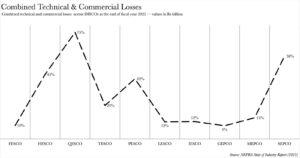The Federal Cabinet is poised to sanction the inception of Performance Management Units (PMUs) within five beleaguered power Distribution Companies (DISCOs). This move will place these entities under the oversight of a currently commissioned Brigadier of the Pakistan Army. Consequently, a significant portion of Pakistan’s DISCOs will once again find themselves under the Army’s stewardship once more.
The inaugural PMU is slated for installation within the confines of the Hyderabad Electric Supply Company (HESCO). This unit will be an amalgamation of officers hailing from the Pakistan Administrative Service, the Federal Intelligence Agency, and the Intelligence Bureau. The reins of the PMU will be held by a one-star general from the Pakistan Army — a Brigadier. This unit will maintain a direct line of communication with the Federal Secretary of the Power Division at the Ministry of Energy.
The decision comes in the wake of the Government of Pakistan’s Federal Footprint, State-Owned Enterprises (SOE) for fiscal year 2020-2022, which identified Pakistan’s power sector as the single biggest fiscal drain in the country, with losses of Rs 321 billion. The government-owned DISCOs contributed Rs 376 billion to the figure, thus single-handedly wiping out the profits made by the entire remaining power sector.
Read more: DISCOs lead the way for power sector’s Rs321bn in losses
The Power Division projects that the fiscal year 2023-2024 will witness the DISCOs’ losses surpassing those delineated in the aforementioned report, with the new losses escalating to an alarming Rs 589 billion.
While the uninitiated might construe this as the Government of Pakistan adopting an innovative solution to staunch the fiscal haemorrhaging of the power sector — it is not. This marks the second instance within a span of 25 years where the Pakistan Army will be entrusted with the stewardship of Pakistan’s DISCOs. However, before we delve into the depths of this decision, let us first explore the rationale behind the selection of HESCO amongst all DISCOs.
Why HESCO?
Pakistan’s DISCOs fall into two categories: the dishearteningly dismal and the downright dreadful. Each is marked by a degree of incompetence, yet they vary in the extent of their inefficiency.
The dismal cadre includes the Lahore Electric Supply Company (LESCO), Faisalabad Electric Supply Company (FESCO), Gujranwala Electric Power Company (GEPCO), Islamabad Electric Supply Company (IESCO), and the Tribal Electric Supply Company (TESCO). The dreadful assembly, on the other hand, comprises the Multan Electric Power Company (MEPCO), Quetta Electric Supply Company (QESCO), Sukkur Electric Power Company (SEPCO), Hyderabad Electric Supply Company (HESCO), and Peshawar Electric Supply Company (PESCO).
It’s crucial to acknowledge that the aforementioned ten DISCOs were part of the Central Power Purchasing Agency-Guarantee system in 2022. K-Electric operates under its unique dynamics, while the performance of the nascent Hazara Electric Supply Company (HAZECO) remains under evaluation.
Over the years, successive governments have endeavoured to remedy the issues plaguing the dreadful DISCOs before addressing the dismal ones. This strategy stems from the belief that the dismal DISCOs, despite their shortcomings, are likely to find a buyer and can be privatised, whereas the dreadful ones are seemingly beyond redemption.
“There’s a need to scrutinise the Punjab DISCOs vs QESCO, PESCO, HESCO, and SEPCO. The Punjab DISCOs account for nearly 10% of losses due to theft and short recoveries, with the remainder attributed to other provinces. It’s high time we identify the true culprits rather than unjustly vilifying the entire power sector.,” asserts Shahid Iqbal Chaudhry, a former Chief Executive of IESCO.
How does HESCO fit into all this as a testing ground for the new operating model? It held the unenviable honour of being the second-worst for accumulated losses and the third-worst for combined technical and commercial losses among the ten DISCOs at the close of the fiscal year 2022. These dubious distinctions have been retained, primarily due to the absence of any fresh data post the fiscal year of 2022 for the DISCOs.Consequently, although it doesn’t hold the unenviable title of the poorest performer, it precariously teeters towards the lower end of the spectrum — rendering it both a potential phoenix poised for a resounding resurgence, and a desperate entity in the throes of a dire need for a solution.


Now, whether this will work or not is another matter altogether.
Is the second time the charm?
The thing is that the government has failed in this once before. The Government of Pakistan previously handed over the reins of the DISCOs to the Pakistan Army in January 1999 — a full nine months prior to the Musharraf coup d’état of October 1999.
In 1998 the Water and Power Development Authority (WAPDA) was on the brink of financial disaster, owing to a multitude of factors. The Government revealed that by the end of 1998, WAPDA had accumulated a deficit of Rs.45 billion (roughly US$870 million at the time) — a staggering amount that was projected to soar to Rs.74 billion (approximately US$1.43 billion at the time) by June 1999. This would have inevitably resulted in the dissolution of WAPDA. Without funds to pay the salaries, the organisation would have laid off tens of thousands of workers. Moreover, it would have crippled the entire country, rendering the lives of the citizens unbearable.
Hence, to prevent a total meltdown of WAPDA, the federal Government handed over WAPDA and the new DISCOs to the Army. The Army was thus tasked with assisting the WAPDA management in restoring the financial viability of the organisation by curbing pilferage and power theft. The Government emphasised that this was a desperate measure and taken solely to revive WAPDA.
A three-star general was appointed as the Chairman of WAPDA, and consequently the Chairman of PEPCO. Likewise, one-star generals were assigned to lead the various DISCOs, including KESC.
The Army’s involvement in WAPDA spanned two phases. In the first phase, which concluded on 25 July 1999, 31,444 army personnel were deployed to WAPDA. After 25 July 1999, only about 10% of the army personnel remained and the rest returned to their units. The army personnel aided the organisation in: (a) removing unauthorised connections, which numbered in the tens of thousands; (b) replacing faulty metres; (c) ensuring prompt and accurate billing; (d) checking the metres by surveillance teams; (e) issuing detection bills where theft was detected; (f) maintaining the system to minimise technical losses; and (g) launching a recovery campaign to collect public revenue. These specific benchmarks would become the standard for all anti-theft campaigns in the power sector in the future.
The Army also had an additional mission that it had to accomplish within a two-year period, after which, as a logical consequence, it would withdraw, as by then WAPDA would have been unbundled through the process of corporatisation, with some of its offshoots, such as FESCO, LESCO, and at least two generation companies, securely transferred to private hands. Regrettably, none of the aforementioned materialised.
“In 1999, the chief executives of all DISCOs, bolstered by a cadre of Army officers, were ushered in,” muses Himayat Ullah Khan, a former Federal Secretary at the Ministry of Water and Power, and a former Energy & Power Advisor to the Chief Minister of Khyber Pakhtunkhwa. “The Chairman of WAPDA was appointed as a serving Lieutenant General, ably assisted by a Major General and a legion of Brigadier-level officers at the WAPDA House headquarters, complete with a full-fledged Intelligence apparatus under a Brigadier,” Khan continues.
“The experiment was a failure. Why do we not learn from our mistakes?” Khan questions. “The reasons for the DISCO performance failure, often attributed to ‘lack of leadership’ and ‘mismanagement’, are misguided. The roots of failure run deeper,” Khan expounds further.
The odds are heavily against this initiative. There is no room for doubt. However, there are some who harbour optimism for the initiative’s success.
“I believe, thus far, the Special Investment Facilitation Council and the incumbent Government have made judicious decisions on the economic front – for instance, the unbundling of the Federal Board of Revenue, the transfer of the Heavy Electric Complex to the successful bidder, and the resolution of issues with K-Electric – just to name a few,” asserts Hasnain Haider, a former Chairman of FESCO.
“Based on these precedents, I am confident that the current proposal for the five loss-making DISCOs, if implemented even for a brief period, will significantly help stem the tide,” Haider adds optimistically.
“The technical aspects, including such matters as the addition of transmission lines, the establishment of new grid stations, the expansion of the network, and the installation of SMART meters, will, of course, need to be managed by the respective professional managements,” Haider adds. “Upon achieving stability, a minimum of two or three of the beleaguered Discos ought to be entrusted to the private sector, under the auspices of meticulously crafted, long-term performance contracts,” Haider concludes with conviction.
Khan and Haider, though their perspectives diverge on the effectiveness of this particular initiative, find commonality in their proposed remedies.
“K-Electric, despite all its negative criticism, some of which is indeed valid, provides a blueprint for the DISCOs. It’s not a flawless blueprint, but it’s a model that doesn’t contribute to our circular debt,” articulates Khan.
The PMU must possess an unambiguous vision of the ultimate objective it endeavours to achieve — privatisation. This was the very ambition the Army sought to realise in 1999. The rationale for transitioning them to the private sector was the very impetus behind the DISCOs’ separation from WAPDA in 1996.
The relentless pursuit of all solutions, bar the very first one conceived to rectify the DISCOs, is at the heart of their quandary. This will mark the second Army administration of the DISCOs, amidst the fourth anti-theft campaign, and whilst the DISCOs are under the aegis of their third parent entity.
This publication has already chronicled the history of the DISCOs, the rationale and the process of their inception, and the relentless cycle of solutions and challenges that Pakistan has been ensnared in since the DISCOs were first established.
Read more: A brief history: The rot in our DISCOs

























GET RICH WITH BLANK ATM CARD, Whats app: + 1 803 392 1735
I want to testify about Dark Web blank atm cards which can withdraw money from any atm machines around the world. I was very poor before and have no job. I saw so many testimony about how Dark Web Online Hackers send them the atm blank card and use it to collect money in any atm machine and become rich I email them also and they sent me the blank atm card. I have use it to get 500,000 dollars. withdraw the maximum of 5,000 USD daily. Dark Web is giving out the card just to help the poor. Hack and take money directly from any atm machine vault with the use of atm programmed card which runs in automatic mode.
You can also contact them for the service below
* Western Union/MoneyGram Transfer
* Bank Transfer
* PayPal / Skrill Transfer
* Crypto Mining
* CashApp Transfer
* Bitcoin Loans
* Recover Stolen/Missing Crypto/Funds/Assets
Email: darkwebonlinehackers @ gmail . com
Telegram or Whats App: + 1 803 392 1735
MY PERSONAL EXPERIENCE ON LOST CRYPTO RECOVERY!
I read so many stories about bitcoin loss to scams. I will like to start by saying the agencies responsible for bitcoin security has really done nothing to help locate stolen or lost coins. In my situation my MacBook was hacked by someone that had access to my emails, i immediately contacted blockchain and they only wasted my time, after which i worked towards getting help else where, i was referred to consult a bitcoin expert who helped track and retrieved my 3.3 btc, for an agreed fee. I was more than grateful and willing to pay more after the job was done. Thankful i didn’t fall victim and would like to recommend ( MORRIS GRAY 830 @ G maiL . COM )